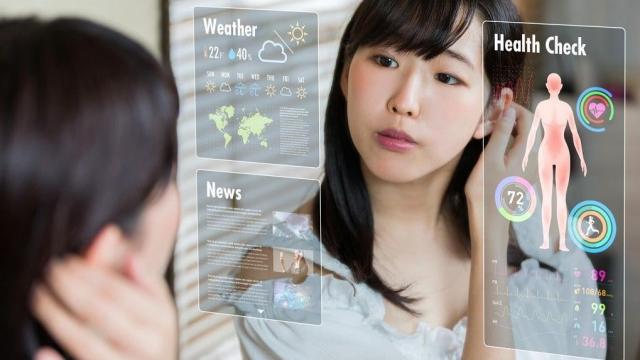L’Oréal is always experimenting with ways to make beauty a more tech-savvy industry, with a personalised makeup dispenser, a home hair dye device, wearable UV sensors, and more. Weird gadgets aside, the company is now partnering with Verily, Google parent Alphabet’s biotech subsidiary, with a goal of making beauty and skincare even more personal, but backed by science.
Skincare — that is, the serums, cleansers, and moisturizers most of us slather on our bodies — is a $US100 ($139) billion industry and is projected to grow to $US145 ($201) billion by 2028. Some of us buy products for preventative reasons. I use a variety of creams with SPF to ward off skin cancer, which I am genetically predisposed to, and also potions with retinol and vitamin C, because I am a tiny bit vain and would like to have smooth, clear, wrinkle-free skin until I die. (This is not asking too much.)
Then there are the one in four Americans who struggle with skin diseases like acne, rosacea, psoriasis, and dermatitis, and figuring out how to treat those issues is an incredibly personal struggle — the formulations of various recommended products might work for some but not for all. L’Oréal and Verily’s new partnership is primarily a research one: The two companies will work together and with dermatologists to launch a platform to study skin biology. Eventually, that research could lead to the development of skincare products that would help people deal with skin issues — or, if possible, prevent them entirely.
“When we use skincare products, when we have acne or eczema, there’s a lifelong management of your skin,” said Guive Balooch, L’Oréal’s vice president overseeing its technology incubator. “We knew that we had to figure out a way to go beyond what is being done today in the beauty industry, and go deeper and understand if we could build better platforms.”
So what does that mean for those of us fumbling our way through Sephora trying to cobble together a skincare routine that won’t exacerbate our existing problems and might actually cure them? Well, not much, for now. L’Oréal and Verily plan to launch their platform for dermatologists within the next year. That platform has physical elements — spectral devices, optical sensors, and measurement tools that dermatologists can use on patients to collect more data about the skin — and a digital side, with new algorithms built around understanding skin conditions like acne and rosacea. Presumably, dermatologists can prescribe treatments for skin conditions and then input the success of those treatments into L’Oréal and Verily’s platform, thereby improving the algorithm.
I see a dermatologist once a year for my annual skin screening, but also just to ask little questions about how the routine I’ve created is affecting my skin. Did I give myself milia with this incredibly popular avocado eye cream? (Yes, I definitely did.) Is this sudden dark spot on my cheek problematic and/or treatable? (No, and yes.) I imagine all of this information I provide being used to improve an algorithm that can then be used to create deeply personal skincare routines that actually work, and reader, I confess I get a little thrill. It’s a very cool idea! We’re nowhere close to that, but this is an interesting step in that direction.
“One day, we can imagine I would have information about the biology of my skin that could tell me a certain product would work really well,” Balooch said. “I believe that’s a good thing, because the more that we understand our consumers the better, but the more consumers understand their own skin, the better decisions they can make, and the more effective the products will be.”
There are, of course, some questions about the kinds of products or services that L’Oréal might create based on the data it gleans from this partnership. Personalised skincare startups are a dime a dozen these days, but by working with Verily, L’Oréal may actually have science to back up whatever serums it eventually develops. Products that treat medical conditions are required to be approved by the Food and Drug Administration and must undergo clinical trials to ensure they’re safe and effective, and it’s unclear whether L’Oréal will go that route, or if the personalised skincare products will be more of the cosmetic variety. The first step is gathering data, and as someone who is deeply fascinated by both beauty products and health research, I’m curious to see the results of L’Oréal’s more scientific approach to skincare.
